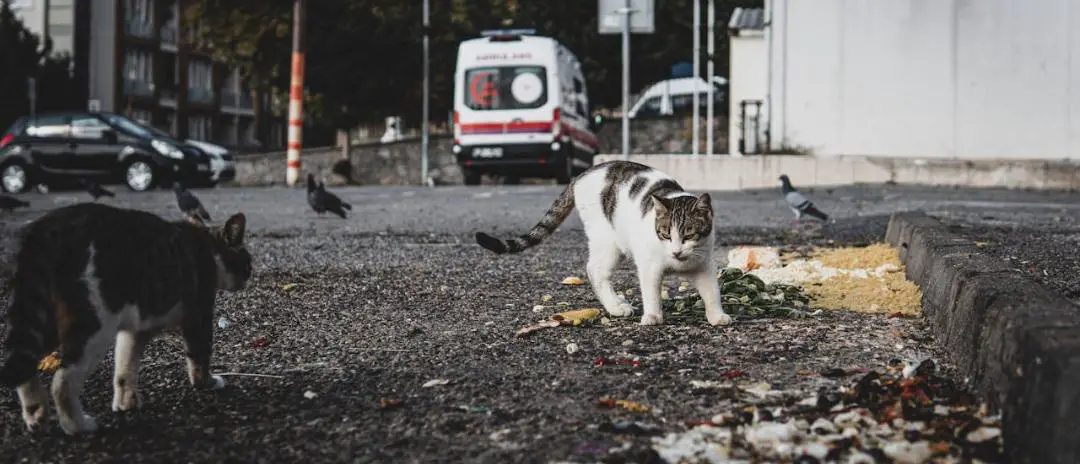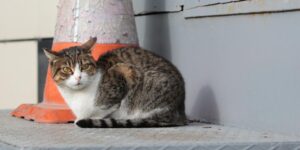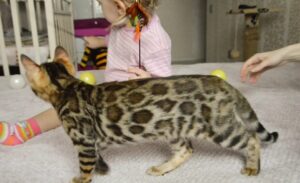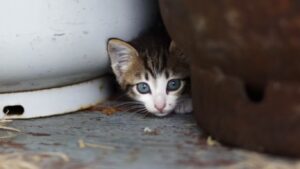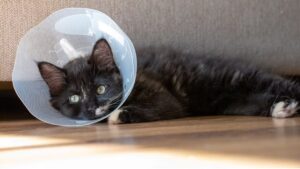I do have a male cat “Oscar” so I feel it is understandable to discuss male cat behavior during mating season.
Based on my experience with my cat “Oscar” I can tell you that mating season comes with lots of different funny behaviors in male cats.
From territorial displays to mesmerizing vocalizations, join me as I delve into the captivating world of male cat behavior during mating season.
I have lots of friends who own male cats, so I also asked them about their male cat behavior during mating season before making this post.
So keep reading to find out more…
Male Cat Behavior During Mating Season
Based on my personal experience living with my male cat Oscar, and what I gathered from my friends who own male cats, here are some common male cat behavior during mating season:
1. Increased attempts to escape from the house
I gathered from my friends that during mating season, male cats experience a surge in hormones that drive their desire to find a female mate.
This instinctual urge can lead them to become more persistent in their attempts to escape from the house to find a mate.
They may exhibit behaviors such as scratching at doors or windows, meowing loudly near exits, or even trying to squeeze through small openings.
This behavior is their way of responding to their biological imperative to find a potential mate and engage in mating behaviors.
To manage this behavior, I suggest you ensure that your male cat is kept in a secure and safe environment.
You should consider providing them with ample mental and physical stimulation indoors through interactive toys, scratching posts, and playtime.
Additionally, spaying or neutering your cat can help reduce their desire to roam and escape, as it eliminates the hormonal drive for mating.
2. Pushy and demanding
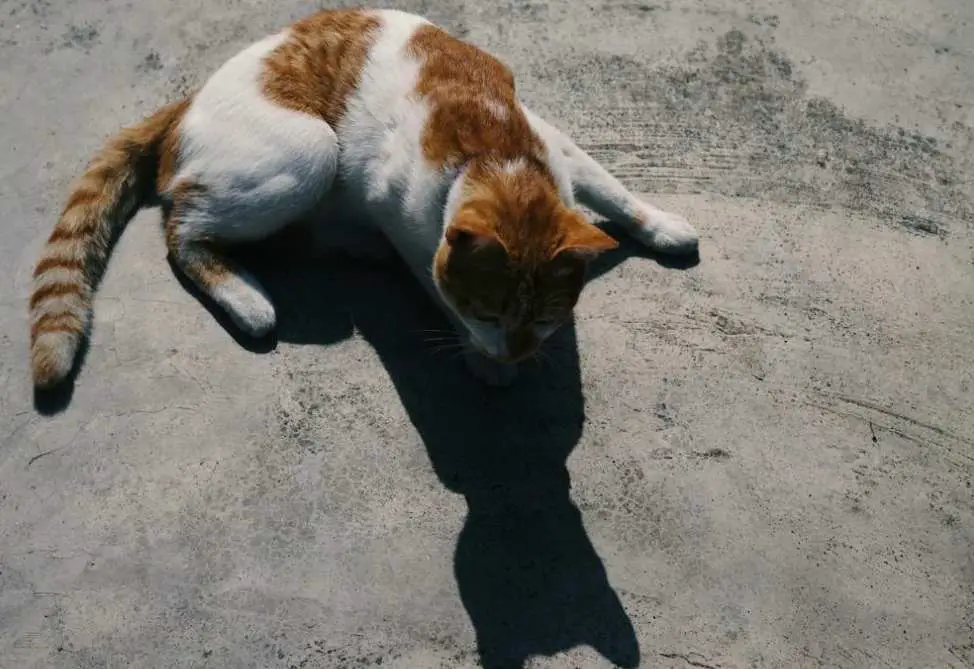
My cat male Oscar is used to being very demanding during mating season, so I can tell that most male cats may become more demanding and pushy during mating season, seeking attention and companionship from their owners.
They may rub against objects, or people, or even vocalize loudly to express their frustration and desire for interaction.
This behavior is driven by their heightened instincts and the need for social and physical stimulation.
To manage this behavior, I recommend you should provide your male cat with extra attention and playtime.
You should engage them in interactive play sessions using toys or provide puzzle feeders to keep them mentally stimulated.
I advise creating an enriched environment with scratching posts, climbing trees, and hiding spots, which can also help relieve their pent-up energy.
By channeling their energy into positive activities, you can help reduce their pushy and demanding behavior.
Related: how unneutered male cats behave.
3. Raised hindquarters while walking
When a male cat is in the presence of a female in heat, he may exhibit a posture known as the “lordosis reflex.”
This behavior involves walking with their hindquarters raised and their back slightly arched.
The raised hindquarters position is an instinctive response that allows for successful mating. It aligns the male cat’s reproductive organs with the female’s during copulation.
The lordosis reflex is a visible signal to the female cat, indicating the male’s readiness to mate.
This posture, combined with other behaviors like vocalizations, tail movements, and scent marking, helps establish communication between potential mates during the mating process.
4. Territorial spraying and scent communication
Male cats have scent glands located in their cheeks, paws, and around their anal area.
During mating season, these glands become more active, and male cats may engage in territorial spraying.
By spraying urine, they are marking their territory and communicating with other cats.
This behavior is more common in unneutered males, as the hormones drive them to establish their dominance and attract potential mates.
Neutering your male cat can help reduce or eliminate this behavior completely.
Related: Neutered male cat behaviors.
5. Pacing and scratching at doors or other surfaces
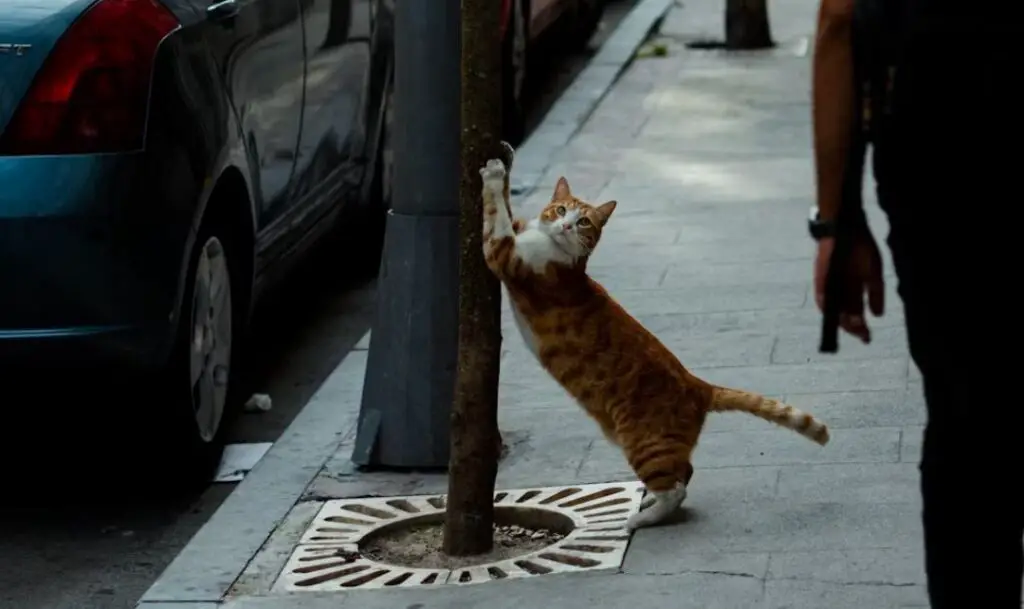
When a male cat is in the grip of mating season, he can become quite restless, this restlessness may manifest as pacing back and forth or scratching at doors, walls, or furniture.
These actions indicate his frustration or desire to go outside and search for a female in heat.
If you notice your cat exhibiting this behavior, it’s a good idea to provide him with extra playtime, toys, and interactive activities to help redirect his energy.
6. Frequent roaming and exploring the territory
My cat Oscar is used to roaming around during mating season, so I believe most unneutered male cats have a strong instinct to explore and expand their territory, especially during mating season.
They will venture further from home than usual in search of potential mates, and this behavior from what I gathered is driven by their desire to find receptive females and establish their dominance.
It’s important to keep a watchful eye on your male cat during this time, as he may be more prone to getting into fights, encountering hazards, or becoming lost.
I advise you to ensure that your male cat is microchipped, and keeping him indoors during mating season can help mitigate these risks.
7. Increased aggression towards other male cats
I gathered from my friends who own male cats that male cats will become more aggressive toward other males during mating season.
This aggression stems from their competition for mates and the desire to establish dominance.
You will notice your male cat engaging in aggressive behaviors such as hissing, growling, swatting, or even fighting with other male cats in the area.
To prevent conflicts, it’s advisable to keep unneutered males separated and supervised during mating season.
Neutering your male cat can also help reduce aggressive behavior, as it decreases the levels of testosterone.
8. Heightened energy levels and increased activity
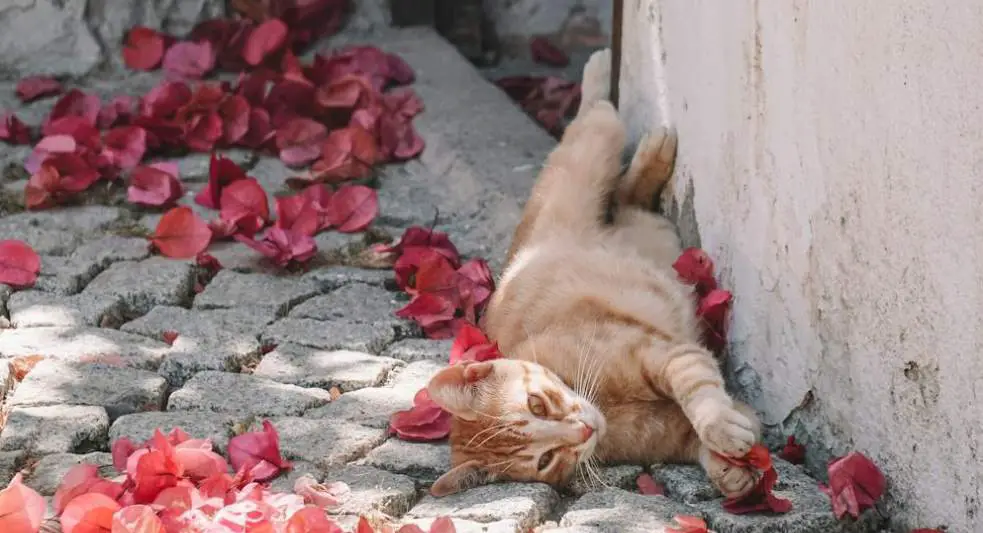
From what I gathered, during mating season, male cats often experience a surge in their energy levels.
You will notice that your typically laid-back and lazy male cat suddenly becomes a ball of energy, bouncing off the walls and zooming around the house at lightning speed.
This increase in activity is a natural response to their biological instincts, as they feel the urge to seek out a female mate.
To channel this excess energy in a positive way, it’s important to provide your male cat with plenty of opportunities for play and exercise.
Interactive toys, such as feather wands or laser pointers, can help keep them engaged and physically active.
It would be best if you also considered setting up a designated play area or installing cat shelves and scratching posts to encourage climbing and exploration.
9. Vocalizations and restlessness
Male cats in mating season can become quite vocal and restless, they may engage in prolonged and loud meowing, yowling, or even caterwauling.
These vocalizations are their way of communicating their availability and attracting the attention of female cats in the area.
While it can be a bit disruptive to your household, it’s important to understand that this behavior is natural for your male cat during this time.
To help alleviate their restlessness, you should try providing a calm and peaceful environment.
You should also create a cozy space with comfortable bedding where they can retreat and relax.
Additionally, engaging in interactive play sessions and providing mental stimulation can help redirect their energy and provide a healthy outlet for their instincts.
Related: Behaviors of a male cat after mating.
10. Unusual mounting behavior
One of the most noticeable behaviors exhibited by male cats during mating season is their tendency to engage in mounting behavior.
This behavior involves the male cat mounting and gripping onto objects, such as pillows, blankets, or even other animals, in a simulated mating motion.
This behavior is a manifestation of their sexual instincts and is their way of expressing their desire to mate.
If your male cat is exhibiting mounting behavior, it’s important to redirect their attention to more appropriate outlets.
Provide them with toys that they can wrestle and play with, such as stuffed animals or interactive puzzle toys.
Neutering your male cat can also help reduce the intensity and frequency of this behavior, as it helps regulate their hormonal levels.
Related: behavior concerns in cats.
Managing Male Cat Behavior During Mating Season

While these behaviors can be interesting to observe, it’s essential to ensure your male cat’s safety and well-being during this time.
Here are some tips to help manage their behavior:
- Keep them indoors: Prevent your cat from escaping by keeping them indoors and blocking any potential escape routes.
- Provide distractions: Engage your cat in play or offer toys to distract them from their mating instincts.
- Show patience: Remember that these behaviors are natural and will eventually subside once the mating season ends.
- Consider neutering: If you’re not planning to breed your cat, neutering can help reduce these behaviors and prevent unwanted litters.
Final Thoughts
In the captivating world of male cat behavior during mating season, we have unraveled the fascinating secrets behind their vocalization, restlessness, and territorial marking.
As spring turns to summer, understanding these natural instincts can help us better care for our feline companions.
So, embrace the enigmatic ways of your male cat during mating season, and embark on a journey of discovery with your furry friend.
Frequently Asked Questions
What are the signs that indicate male cat behavior during mating season?
Male cats during mating season often display increased vocalization, urine marking, and restlessness.
How long does the mating season typically last for male cats?
The mating season for male cats usually lasts from early spring to late summer, but it can vary depending on factors such as climate and individual cat behavior.
Do male cats change their behavior towards humans during mating season?
Yes, male cats in mating season may exhibit more aggressive behavior towards humans, such as biting or scratching, as their hormones drive them to seek out a mate.
Can neutering prevent male cats from displaying mating season behavior?
Yes, neutering male cats can significantly reduce or eliminate mating season behavior, as it reduces their hormone levels and curbs their desire to mate.

